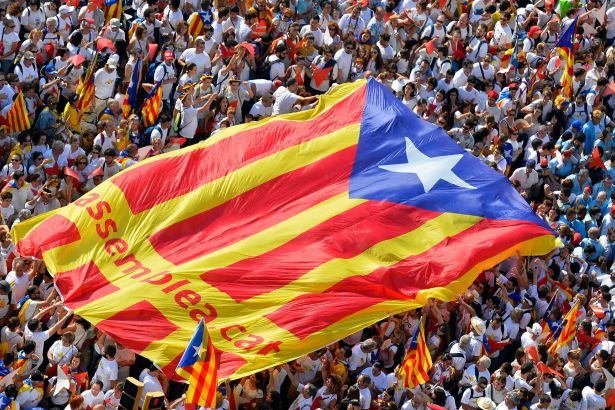Communist Party of Turkey indicates to recent capitalist crisis amid Catalonia referendum

Member of the CC of the Communist Party of Turkey (TKP), soL columnist, Aydemir Güler wrote an article on Oct. 2 about the recent tide of independence referendums from Masoud Barzani-led Iraqi Kurdish region to Catalonia, indicating to the recent capitalist crisis and the rise of ethnic nationalism.
This is not an ordinary crisis
The referendums for independence in Catalonia and Barzani-led Iraqi Kurdistan are the newest links of a long chain. Regardless of their particular, concrete justifications, recent movements of independence should be considered as part of the same context. Sometimes, there occur exceptions to general historical tendencies: some row against the tide while everyone heads the other way… That is not the case this time.
As such, the issue got beyond the problems of a particular EU member or the EU altogether. How could it be possible to render the people of Catalonia an "oppressed nation" -to put it in the old parlance- in the absence of an essential factor, that is, economic inequality? True, we criticize the hypocrisy of EU democracy. It would be an overstatement to speak of an oppressive environment regarding cultural and linguistic freedoms, except for some traditional minorities (e.g., Romani) and the most recent immigrants.
On the other side, it would also be absurd to categorize the region under Barzani rule as another oppressed nation within Iraq. Since American invasion, it has been the most economically favoured region of the country.
Beside these two recent examples, remember those who were presented as "insurgents against Serbian persecution" while separating from Yugoslavia. Do not forget those who -most irrelevantly- "discovered" the relation of national oppressors and the oppressed during the Soviet era to justify their independent states. The Occitan, language of an ancient people located in today’s France, is confined to street signs for the moment; but a "libertarian" movement was on the rise for a time in northern Italy, arguing that they shouldered the burden of the poor southerners. It is difficult to regard Brussels, the European centre, as the capital of Belgium; we see Wallonia on the one side and Flanders on the other. It would be ridiculous to define these fragments as oppressed nations…
Even relatively long-established entities will soon have to adapt changing circumstances.
The new condition indicates to a heavy crisis of nation-based entities, states, and ideologies, which have taken shape along with capitalism thus far.
It seems that existing national dynamics continue to rise and force the gates. Nevertheless, the appearance is misleading. Moreover, nationalism cannot claim that "the nation-state remains to stand." Nationalists are displeased with emerging nationalist movements. The "libertarian leftists" who used to cheer alongside Washington for "the nation-state is ceasing to exist" at the turn of the millennium, play the dumb nowadays, as ethnic micro-nationalisms proliferate. With so many identities, it turned into something other than freedom.
One cannot make a nation out of Catalonia. Nor out of the Flemish. The existence of different languages would not be sufficient. One cannot manufacture a nation from Barzani’s tribe. Despite the fact that Madrid takes Turkey’s President Recep Tayyip Erdoğan as a role model and provokes the "fifty-percent"* to attack ballot boxes and masses, such oppression cannot justify its opponent only by itself. The same applies to the non-stop threats by the Baghdad-Tehran-Ankara triangle against Barzani…
This is not an ordinary crisis.
Capitalism had inherited ethnic, economic and cultural associations and manufactured modern nations through developing these at the hands of the state. Organizing of national education, providing the countryside with electricity, building an ideology; or suppressing and eliminating native cultures; or rather, oppressing the dissidents, rendering them enemies, bribing them; all are instances of nation-building under capitalism.
Later, the bourgeoisie, the vanguard of this period, established transnational institutions in line with capitalism’s unlimited tendency to expand, even forming an international capital. Reaching the imperialist phase of capitalism became reason enough to undermine and nullify the nations they had established previously.
This adventure lasted for about two centuries. A few decades more, perhaps, if you date it further back.
Socialism stamped a colossal anti-imperialist mark on nations’ banner of emancipation at the last juncture. The tides of independence rising from the coasts of Asia, Africa, and South America in the last century caused imperialist capitalism to dither.
Challenging that tide with globalism, the era of liberty, identities, and trans-border capital, capitalism does not stick to any model today. Ethnic nationalism, ongoing huge migration, and the loss of credibility of globalist ideology due to imperialist wars and decade-long crisis… There is no model today, nor will be! Humanity has lived under the nation form and the community of states emerged on that basis for a historical period. That system is dissolving today. There is only one way out for the bourgeoisie: war and redistribution of the world’s wealth. However, a century ago, at a similar crossroads, the exploiters could more or less estimate what sort of an establishment they should have imposed on the world. Today, they are at the zero point.
This is a grave crisis.
And yet again, that is a historical opportunity. Time of the working class is approaching, for them to say: "We have an answer!" Oddly enough, it seems that a problem for which the bourgeoisie cannot find a solution is, indeed, a simple job for socialism…
Indeed, this is not an ordinary crisis.
Aydemir Güler refers to the infamous statement of the then Prime Minister Recep Tayyip Erdoğan who said, "There is another 50 percent [that voted for the AKP] that we are having difficulty keeping at home," to provoke his supporters against the anti-government Gezi Park protesters in June 2013.




